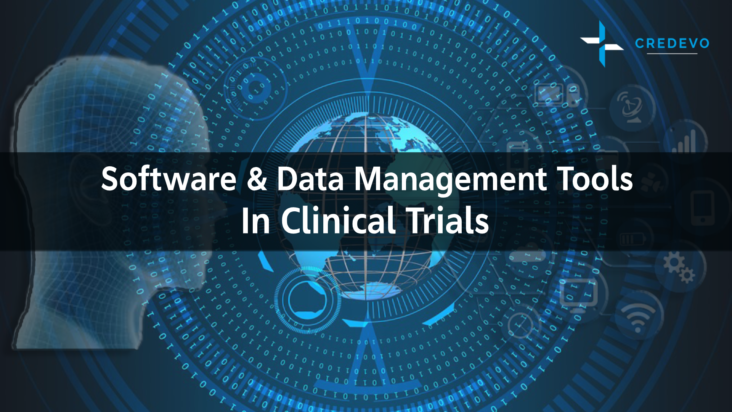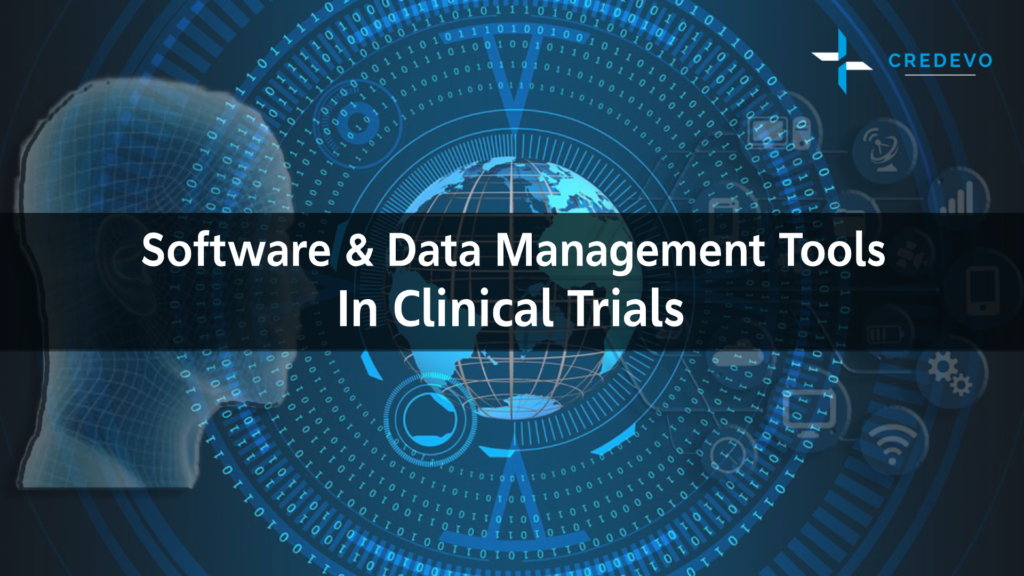Software And Data Management Tools In Clinical Trials

Many companies spend a significant amount of cost and manpower on software and data management tools/systems to handle clinical trial activities to build, monitor, and manage clinical trial data.

Researchers and CRO utilize many software, web-based applications, and cloud source management tools in various stages of clinical development, and here are some of them
- Softwares in protocol design
- Site selection and startup platforms
- Several apps in patient recruitment
- Trial administration
- Operational Data Management
- Managements systems in Drug and Supply Logistics
- Patient management
- Digital biomarkers identifiers
- Virtual trials
Now, let’s discuss some of the useful tools that greatly help small, medium, and large-scale organizations in the clinical development process.
The software in protocol designs
Before initiating any clinical trial, protocol design is a critical step, as an efficient protocol design minimizes delays that arise due to amendments. It, in turn, minimize the costs incurred due to delays and help in completing the trials faster.
- Many organizations have specialties in designing protocols but, for those companies where they lack specialization, Transparency Life Sciences and VitalCrowd are building platforms that crowdsource protocols for clinical trials.
- Verified Clinical Trials (VCT) and TriNetX have real-time tools to analyze protocols.
- Along with these organizations, some non-profit organizations also help in protocol designs.
- For example, the Clinical Trials Transformation Initiative (CTTI) provides guidelines for mobile technology in clinical trials with a focus on novel endpoint design.
Are you looking for the worlclass data management tools and software for your clinical trials?
Complete the form below to connect and talk with our expert team.
Site identification and selection
- Site identification is crucial for any clinical trial as it drives the fate of the research further.
- Improper site identification and inefficient clinical investigators selection leads to failures in
- Patient recruitment,
- Patient retention, and
- Generation of quality data.
- There are several platforms to help sponsor or clinical research organizations to identify potential sites and qualified clinical investigators.
Credevo has developed a web-based online platform where the trial manager or sponsor can conduct feasibility with clinical investigators and sites all around the globe in any therapeutic area.
Conducting feasibility is super easy on Credevo. Connect with us by filling out the form below, and that’s it, you reach thousands of clinical investigators and sites all over the world.
Learn more about conducting clinical trial feasibility
Patient management
- About 70% of clinical trials fail due to poor patient recruitment and retention.
- Identifying and recruiting 100% of patients for clinical trials is a nightmare for many clinical studies.
- However, patient recruiting platforms help to resolve this burden.
- PatientsLikeMe, TrialSpark, TrialX, SubjectWell, StudyKIK, Seeker Health, mProve Health, Langland, Clinical Connection, Comprehend Clinically, and FindMeCure is some of them.
Trial conduction
Data management is another challenging task once the trials have been started
Data management
Clinical Data management in clinical research is the process of data compilation in compliance with good clinical data management practices and applicable regulatory requirements.
Advantages of CDM
- The fundamental objective of the CDM process is to provide high-quality data by reducing data entry errors and gathering maximum relevant data for analysis.
- There are several tools available for clinical data management in clinical research, and these are popularly called Clinical Data Management Systems (CDMS).
- Electronic Data-Capturing (EDC) technology, effective data cleaning methods, and Discrete Data Management plans (DMP) have transformed clinical research operations for sponsors, contract research organizations, and sites.
- Best clinical data management practices are adopted in clinical research to make sure that the data is comprehensive, consistent, and thoroughly checked.
- CDMS handles large amounts of data generated simultaneously from different sites distributed across several continents in multi-centered clinical trials.
Clinical Trial Management System – CTMS
- CTMS helps to maintain and manage the planning, performing, and reporting functions, along with participant contact information, tracking deadlines, and milestones.
- This system maintains and manages the planning, performing, and reporting functions, along with participant contact information, tracking deadlines, and milestones.
Electronic Data Capture (EDC)
During a clinical trial, it is difficult to capture data manually. So to overcome this, a computerized system was designed to collect data during clinical trials in an electronic format, and the system is called EDC – Electronic Data Capture or EDC. Most pharmaceuticals and CROs use these systems.
There are basically three components on an EDC – Graphical User Interface,
- The first is the Graphical User Interface. It contains data entry screens that have a set of data fields to enter data.
- Next comes the Validation Component to check the user data for any errors, and
- The third and final one is the Reporting Tool for data analysis.
Advantages of EDC system
- A user-friendly and systematic approach tends to minimize errors,
- Minimizes the need for multiple copies of data for submission to regulatory authorities, which may take a long time and delay, thus ensuring a faster mode of submission to the regulatory authorities.
- Helps in monitoring the progress of the trial in a smooth way and can make sure that there were no deviations from the protocol during the conduct of the study
- Data review is easier on such systems when compared with the review on papers.
- EDC saves huge space and avoids unnecessary use of paperwork which is environment friendly.
- The data generated in multiple geographies makes it challenging to handle the data. Utilizing the EDC system accelerates and makes data management easy and flexible.
- EDC system offers web-based data entry, medical monitoring, data review, and data clarification processes cost-effectively.
- The EDC system can store forms in the library available in the EDC system, and these forms can be copied from the library and utilized for future trials.
Small to large pharmaceutical and contract research organizations have begun using the EDC system as a data management tool for clinical research.
Disadvantages
Along with advantages, there are disadvantages such as this sophisticated management systems require separate technical staff.
Management system in supply logistics
Previously supply logistics systems dint requires high technical systems, but it’s now not the case. The logistics workflows are attached to electronic data capture systems in clinical trials.
There are many logistics supply organizations that not only supply clinical trial materials but also electronics that are used to capture patient data.
Clinical supply management is critical in rare disease clinical trials as the requirements are often not predictable.
Credevo provides logistic solutions in clinical trials and special logistics services in rare disease clinical trials. Contact us at helpdesk@credevo.com or fill the contact form below
Learn more about clinical trial shipment in rare diseases
Digital biomarkers
- Digital biomarkers are tools that collect behavioral and physiological data.
- These tools help to diagnose and treat patients remotely.
- The FDA has recently made several forward-thinking changes that will speed up the development of digital biomarkers.
Virtual trials
- Virtual sites are the trending leap for pharma companies and CROs as these trials are cheaper, accessing more population and more opportunities to capture real-world data from participants.
- These virtual sites are more prominent in rare disease clinical trials where the patients have often scattered geographies, and traveling becomes a hurdle to patients.
- Patient retention is a concern for rare disease clinical trials. Virtual trials can sort this issue and help the timely completion of clinical trials.
- These virtual trials do not apply to clinical trials where patients need to visit the research site to take treatment.
- There are some companies working for this type of approach such as SageBionetworks (a non-profit organization).
Do you have any queries or requirements for your pre-clinical and clinical drug development?
Talk to us today. Provide preliminary details below and we will help you achieve a successful clinical trial.